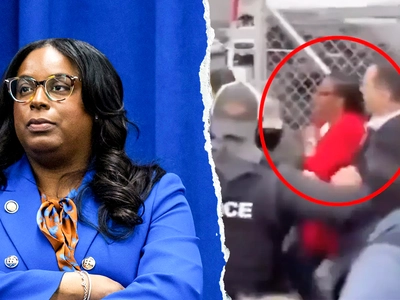What Happened When Democrat Rep. LaMonica McIver Assaulted ICE Agents? Trump and Republicans React
The unthinkable has happened. A sitting member of Congress stands accused of physically assaulting federal immigration officers—and now faces the consequences that should terrify every elected official who thinks they're above the law.
Rep. LaMonica McIver, a New Jersey Democrat, found herself in federal handcuffs after what prosecutors describe as a brazen attack on ICE agents outside the Delaney Hall Federal Immigration Facility in Newark on May 9th. The charges? Forcibly impeding and interfering with federal officers—crimes that could land her behind bars for up to 8 years.
The Incident That Changed Everything
What started as a "congressional oversight visit" quickly descended into chaos when McIver allegedly grabbed and physically interfered with federal officers attempting to make an arrest. According to the Justice Department's three-count indictment, the congresswoman didn't just cross a line—she obliterated it.
The details are stunning. Federal prosecutors allege that McIver forcibly impeded officers not once, but repeatedly, as they tried to do their jobs protecting American communities from illegal immigration. This wasn't a peaceful protest or a strongly-worded statement—this was an elected official allegedly using physical force against law enforcement.
Trump's Victory Lap
When asked about the charges, President Trump's response was swift and decisive: "The days of woke are over." Those five words sent shockwaves through the Democratic establishment and served as a clear message that the era of consequence-free resistance to immigration enforcement has ended.
Trump's administration, through U.S. Attorney Alina Habba, is sending an unmistakable signal: no one is above the law—not mayors, not congresspeople, not anyone who thinks their political position gives them the right to physically obstruct federal immigration enforcement.
The Republican Response: No More Games
Republicans in Congress aren't satisfied with just federal charges. They're pushing for McIver's censure, a rare and serious rebuke that would formally condemn her actions and serve as a warning to other Democrats who might consider similar tactics.
This isn't just about one incident in Newark—it's about establishing a crystal-clear boundary that Democrats have been testing for years. The message is simple: you can disagree with immigration policy, you can vote against it, you can speak out against it—but you cannot physically interfere with federal law enforcement.
The Bigger Picture: A Turning Point for Law and Order
McIver's case represents something much larger than one congresswoman's poor judgment. It's a symbol of the collision between progressive resistance politics and the reality of law enforcement. For years, Democratic officials have pushed the envelope, testing how far they could go in opposing immigration enforcement.
The answer came crashing down in Newark: too far.
What This Means for Democrats
McIver's legal team may claim political persecution, but the facts speak louder than their spin. Federal officers were doing their jobs—jobs that are essential to protecting American communities and enforcing laws passed by Congress. When an elected official physically interferes with that process, they cross from political opposition into criminal behavior.
This case will reverberate through Democratic circles for years to come. Every progressive politician who has considered "direct action" against ICE operations now has to weigh whether their activism is worth federal charges and potential prison time.
The Stakes Couldn't Be Higher
As McIver faces up to 8 years in federal prison, the broader implications are staggering. This prosecution sends an unambiguous message that the Trump administration will not tolerate elected officials who believe their political disagreements justify breaking federal law.
The congresswoman has pleaded not guilty, but the damage to the Democratic Party's credibility on law and order issues may already be done. How do you campaign on "supporting law enforcement" when your own members stand accused of assaulting federal agents?
A New Era of Accountability
Trump's declaration that "the days of woke are over" isn't just political rhetoric—it's a promise backed by federal indictments. The administration is demonstrating that political titles and party affiliations offer no protection when you cross the line into criminal behavior.
For Republicans, McIver's charges represent vindication of their long-standing argument that Democratic resistance to immigration enforcement had gone too far. For Democrats, it's a wake-up call that the rules of the game have fundamentally changed.
The Road Ahead
As this case moves through the federal court system, it will serve as a crucial test of whether American institutions can hold elected officials accountable regardless of their party affiliation. The eyes of the nation are watching to see if justice will be served or if political considerations will once again trump the rule of law.
One thing is certain: the era of consequence-free resistance to federal immigration enforcement is over. McIver's case will stand as a warning to any elected official who thinks their political beliefs justify breaking federal law. In Trump's America, everyone—including members of Congress—will be held accountable for their actions.
The only question remaining is whether Democrats will learn from McIver's mistake or continue to test the boundaries of what this administration will tolerate. Based on the federal charges and Trump's response, they'd be wise to choose carefully.



